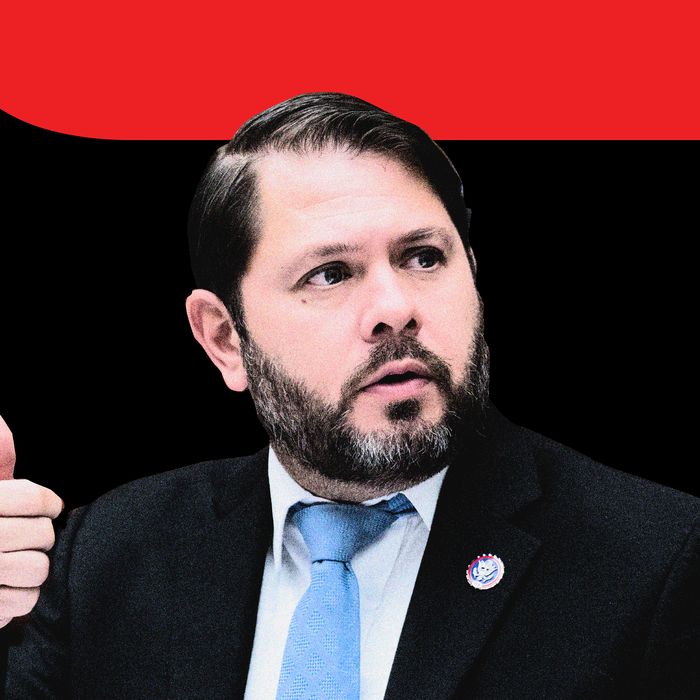
Congressman Ruben Gallego, as you may have heard, wants to make Arizona’s U.S. Senate seats fully Democratic again. The progressive Iraq War veteran is vying to take down former Democrat Kyrsten Sinema in 2024 and whomever the GOP nominates in that race — though he really hopes it will be failed Republican gubernatorial candidate and MAGA celebrity Kari Lake.
In the latest episode of On With Kara Swisher, Kara speaks with Gallego about about Sinema’s chances, why Democrats can’t count on Republican craziness, and issues like the Colorado River crisis and Arizona’s growing tech sector. And as seen in the below excerpt, they also get into the need for tolerance and nuance in liberal political rhetoric as well as whether Arizona Democrats are a model for the national party.

On With Kara Swisher
Subscribe on:
Kara Swisher: Some progressives said you weren’t progressive enough, even though you’re a member of the Congressional Progressive Caucus. Part of the critique is because in 2021, you banned the use of the word “Latinx” in your office. Explain that controversy? Because people have a problem with complexity.
Ruben Gallego: We didn’t ban it. What we said is that if you are going to use it in the office, it has to be requested. And so look, this is a phenomena among Latinos and there is some deep animosity to the word Latinx being used in our community and being imposed upon us. It’s not that we’re anti-trans or we’re not definitely anti-LGBTQ, but a lot of us, and that’s not saying all of us, don’t like that word. Now, what we do in our office is we basically allow the persons that we are communicating with to identify themselves.
So if we are meeting with a group and they say, “Hey, we identify as Latinx,” then we will actually respect that and call them that. But the reason I brought this up is because, to be honest, there was just this conversation happening around political circles, especially among Latino political circles, about what happened in 2020 and why the numbers had kind of gone against us. And a lot of consultants were using this term Latinx while they were trying to communicate to voters. And that was a political mistake, but nobody wanted to bring up it was a political mistake. As the chairman of the Congressional Hispanic Caucus PAC — a very successful PAC; we actually had a lot of strong wins last year, the most ever — it is my job to basically help guide the Democratic Party about how to speak to Latinos. And this is one of those steps to do that.
Kara Swisher: Yeah, you had said … let me read you the quote. “When Latino politicians use the term, it is largely to appease white rich progressives who think it is a term we use. It is a vicious circle of confirmation bias.” I would agree with you. I don’t think anyone likes to impose words on people.
Ruben Gallego: But at the same time, and I also have this other rule, the other rule is the “Don’t be an asshole” rule.
Kara Swisher: Okay, good one.
Ruben Gallego: If somebody asks you to respect them and says, “This is what I want, this is what I want to be identified as,” then you should absolutely do that. And I think you have people that are trying to use this as a cut-and-dry rule.
Kara Swisher: I discussed this idea, though, with San Francisco DA Brooke Jenkins, of trying to wedge her into a box or wedge voters around issues. You’ve talked about your experience on the Latinx conversation as a, quote, “exploitation wedge.” Explain what you mean by that? Because I think she was also talking about this.
Ruben Gallego: Well, I think when I say it’s an exploitation wedge is that, look, we’re having a real conversation among the Latino community, but then there’s outside people that are trying to basically use that conversation as a wedge between us and our LGBTQ friends, or us and more moderate people. And when in fact it’s something that should not be abused. Right? And it’s okay for us to have dialogue and conversations. I think it’s important that we do that, but let’s not also be used as a tool by people to separate us from communities that normally are always aligned and voting together. And I think that that does happen. It happens a lot, and it doesn’t just happen to us. You’ll see that happen in the African American community. You see it happen within the gay community. And I try to make sure that, look, I have my opinions, but I also try to make sure that we’re not used as a wedge between us and our allies as a whole.
Kara Swisher: Let’s define the race too, because you said Sinema — the first Democrat in decades to win an Arizona Senate seat — thinks it’s a red state. You’re doubling down on the idea that it’s blue. Talk about what you mean by that?
Ruben Gallego: Yeah, I think the state is bluer. It’s not blue; we’re not Colorado. Colorado is a blue state. We’re more like a Nevada. You have to fight for it. And I think that the Democratic policies, my policies, my messaging, is going to be a winning message. I think, in the Sinema worldview, that this is still the Arizona of 2012 where she barely won her first race, but the state has been changing. Even in her race in 2018, she credits a lot of her win with having crossover Republican support. And that’s true; there was some of that. But she always forgets to mention the surge of Latino voters that came out for the first time in 2018 that did not vote in 2016 and voted straight down the ticket. These are young Latinos that are out to basically stop Donald Trump. And they’re not the crossover Republicans. A lot of them are very, very progressive, very liberal, and certainly I think this time are not going to be supporting Senator Sinema.
Kara Swisher: Democrats have had a lot of success in Arizona. Sinema, Mark Kelly twice, Biden. What do you think is really to credit for the success? Some magic formula for the Democrats or the fact that MAGA candidates have pushed the state Republicans too far right?
Ruben Gallego: Yeah, it’s a combination of both actually. We have better quality candidates and have for a while. But really since 2010, and this is when I got more involved politically and ran for state house. We’ve been very active in registering and turning out Latinos to vote. That’s your game changer right there, because if you’re a Democrat, you’re getting 60, 70 percent of that vote. And it’s going to only keep increasing over time. And I certainly am going to make sure it definitely increases in 2024.
Kara Swisher: But the MAGA candidate is pushing the Republican Party again, the recounts, the Kari Lake of it all.
Ruben Gallego: The recounts. It’s a bit extreme in general. It wasn’t just the recounts in 2020, how Trump acted post-2016.
Kara Swisher: Well, you have Jan Brewer, you’ve had a lot.
Ruben Gallego: It’s just extremism in general. 2016 was a big wake-up call to Latinos in Arizona. 2018, we came out and voted and helped not just pick up Senator Sinema but we also picked up the secretary of state’s race. We picked up a lot of other big races that year. And I don’t see them having the candidates to really change the narrative in 2024.
Kara Swisher: As you said, Latinos were key to Sinema’s win in 2018. They’re also key to Biden’s winning the state in 2020 and statewide victories last year. But across the nation, Democrats did lose Latino votes in 2020, 2021, 2022. What can the national party learn from Arizona, and why is it bucking the national trend?
Ruben Gallego: Because we actually work every year, an on year and off year, to work and communicate with Latinos. Whether it’s city-council elections, smaller elections — we’re actively always doing voter registration, turnout, education. And that is what has really stopped a slide in Arizona that has not happened in other parts of the country. And also, we have a lot of Latino elected officials in Arizona, and they’re very persuasive. They’re very close to the community, they’re bilingual, and they’re able to communicate our values to the Latino community. And that’s why you have them really stick it out. If you notice some of the states where we’ve lost some people, there aren’t many; a lot of times, they don’t have many Latino electeds that are actually holding up the banner.
This interview has been edited for length and clarity.
On With Kara Swisher is produced by Nayeema Raza, Blakeney Schick, Cristian Castro Rossel, and Rafaela Siewert, with mixing by Fernando Arruda, engineering by Christopher Shurtleff, and theme music by Trackademics. New episodes will drop every Monday and Thursday. Follow the show on Apple Podcasts, Spotify, or wherever you get your podcasts.
More From 'on with kara swisher'
- Ron Klain Still Thinks Biden Got a Raw Deal
- Gretchen Whitmer on Why She’s Still Confident in Biden
- AOC on Gaza, Insults, AI, and Whether Trump Will Lock Her Up





























